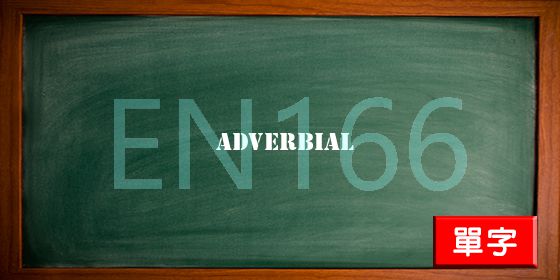adverbial adj.副詞的;狀語的。 an adverbial cl...
adj. 副詞的;狀語的。 an adverbial clause [phrase] 副詞子句[片語]。 adverbial equivalents 副詞同等詞。 n. 副詞類。 adv. -ly “adverbial clause“ 中文翻譯: 狀語從句“adverbial expression“ 中文翻譯: 狀語性詞語“adverbial idiom“ 中文翻譯: 副詞片語“adverbial object“ 中文翻譯: 狀語性賓語“adverbial phrase“ 中文翻譯: 副詞片語“adverbial clause of cause“ 中文翻譯: 原因狀語從句“adverbial clause of concession“ 中文翻譯: 讓步狀語從句“adverbial clause of condition“ 中文翻譯: 條件狀語從句“adverbial clause of manner“ 中文翻譯: 方式狀語從句“adverbial clause of mixed condition“ 中文翻譯: 錯綜條件句“adverbial clause of place“ 中文翻譯: 地點狀語從句“adverbial clause of purpose“ 中文翻譯: 目的狀語從句“adverbial clause of real condition“ 中文翻譯: 真實條件狀語從句“adverbial clause of result“ 中文翻譯: 結果狀語從句“adverbial clause of time“ 中文翻譯: 時間狀語從句“adverbial clause of unreal condition“ 中文翻譯: 非真實條件狀語從句“adverb preposing“ 中文翻譯: 副詞前置“adverb of time“ 中文翻譯: 時間副詞“adverb of place and position“ 中文翻譯: 地點和位置副詞“adverb of place“ 中文翻譯: 地點副詞“adverb of manner“ 中文翻譯: 方式副詞
Both “ long and a long time “ are used as adverbial expressions of time . “long和alongtime”都用作表示時間的狀語。 |
|
adversary |
|
After clarifying the classification criterion for the semantic roles of nominal objects in monotransitive constructions , this paper attempts to make a contrastive study of the different types of semantic roles of nominal objects in english and chinese monotransitive constructions , and explores the underlying mechanisms with reference to the concepts of proto - patient , adverbial object and peripheral object 摘要在對名詞性賓語語義角色的分類標準進行界定的基礎上,系統考察了英漢語單及物構塊中名詞性賓語語義角色類型及其異同,并從原型受事理論、狀性賓語和代體賓語三個角度來解釋出現這種異同的深層機制。 |
|
Nouns in news titles not only can be subjects and objects , but also can be adverbials to modify predicates directly . the verbs that refer to movement are most frequently used in news titles . verbs in news titles not only can be predicates or the key words of predicates , but also have some special usages such as verb - object structure with object , transitive verb with special object , ect 新聞標題中的名詞,絕大多數是表示人或事物的名詞,在語法上不僅經常做主語和賓語,還經常做狀語直接修飾謂語動詞;新聞標題中的動詞,動作動詞使用的頻率最高,在語法上不僅經常做謂語或謂語中心,還出現了動賓結構帶賓語、及物動詞帶特殊賓語等一些特殊用法;新聞標題中的形容詞,性質形容詞占絕大多數。 |
|
It can be seen from the above , by adding adverbial modifier , complement modifier and attributive clause , one simple sentence ( underlined part ) will develop to a principal and subordinate compound sentence with an attributive clause 所以,如果句中詞、短語和句子間,主、次要成分間插入并列、主從成分便會使句子變長;有的句中還出現了成分的省略、倒裝和分割等,這就構成了更為復雜的長句。 |
|
Besides serving as independent attributives modifying the headword , pronouns indicating others can concur with nominal attributives , predicate attributives or adverbial attributives , modifying the headword 摘要除單獨作定語修飾中心語以外,旁指代詞還可以與體詞性定語、謂詞性定語和副詞性定語共現,共同修飾中心語。 |
|
Word order plays an important role in chinese grammar . usually , the verb precedes the object ; the modifier ( attributive and adverbial ) precedes the central words 在漢語里,詞序是一種重要的語法手段。漢語的詞序,一般是主語在前,謂語在后;動詞在前,賓語在后;修飾成分(定語和狀語)在前,中心語在后。 |
|
Positional phrases directly used as adverbials were common grammatical phenomena in modern chinese and there are a few examples in present chinese 方位短語直接充當狀語是近代漢語中較為常見的語法現象,現代漢語當中雖不普遍,但仍有少量用例。 |
|
( in chinese , a preposition plus a nominal structure used as the adverbial must be placed before the predicate , e . g 在漢語中介詞加上后面的名詞性結構作狀語,一定要放在謂語的前面,不能放在謂語的后面。 |
|
In 《 the selection of yuanqu 》 , the positional phrases with no prepositions before them were used as adverbials and complements 《元曲選》中,方位短語前不加介詞可直接充當句子的狀語、補語。 |
|
Besides , conditional adverbial clauses ( phrases ) , parenthesis , and the different usages of voice own their respective styles 條件狀語或從句、插入語和不同語態的使用也有其自身風格。 |
|
If there are both adverbials of time and place in a sentence , the adverbial of time precedes the adverbial of place 如果一個句子里既有時間狀語,又有地點狀語,時間狀語一般在前。 |
|
An analysis of the conjunctions of the adverbial clause of time and the tense and aspect of the predicate 淺析時間狀語從句中連接詞及其謂語時間和體的意義 |
|
Adverbial modifying units are used to give more information about actions or adjectives 副詞類的修飾單位慣常用于提供進一步關于行為動作或形容詞的資訊。 |
|
Usage of quantifiers functioning as adverbials in negative statements in japanese 作副詞用的數量詞在日語命題否定句中的特殊表現 |
|
Adverbial clause of time 時間狀語從句 |
|
Adverbial clause of cause 原因狀語從句 |
|
Adverbial clause of place 地點狀語從句 |
|
Adverbial clause of result 結果狀語從句 |
|
Some factors for auxiliary word mixing in the structure of adverbial modifier and headword 狀中結構助詞混用的幾個影響源 |

